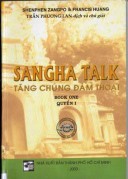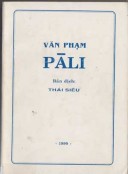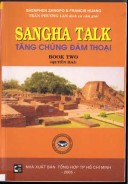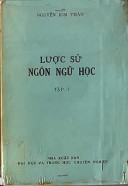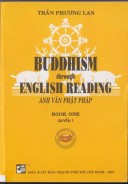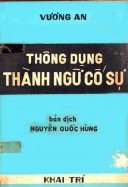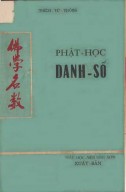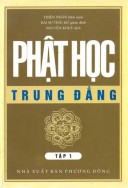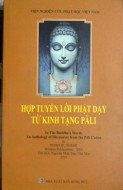Tìm Sách
Ngôn Ngữ >> SANGHA TALK Tăng chúng đàm thoại I
Thông tin tra cứu
- Tên sách : SANGHA TALK Tăng chúng đàm thoại I
- Tác giả : Shenphen Zangpo & Francis Huang
- Dịch giả : Trần Phương Lan
- Ngôn ngữ : Anh - Việt
- Số trang : 316
- Nhà xuất bản : TP. Hồ Chí Minh
- Năm xuất bản : 2003
- Phân loại : Ngôn Ngữ
- MCB : 12010000006916
- OPAC :
- Tóm tắt :
SANGHA TALK
TĂNG CHÚNG ĐÀM THOẠI
Begiiner andIintermediate levels
Book one
Shenphen Zangpo & Francis Huang
Trần Phương Lan dịch và chú giải
PREFACE
After beginning teaching conversational English at Buddhist Institutes in Taiwan, it became apparent that there was a lack of suitable teaching material. I thought to design a textbook series specifically aimed at introducing basic Buddhist terminology along with conversational English that could be used to teach the Sangha, but resolve to actually put it to print didn’t come until visiting India in 1995.
There I met other teachers who, like myself, were using conventional textbooks and a lot of improvisation. They encouraged me to begin the project. This book is the result of their encouragement.
The West desperately needs competent Dharma teachers who can speak English. I hope that in a small way this text may help fulfill this need.
THEME OF THE TEXT
The text is based on a group of Buddhist monks and nuns attending an international Buddhist institute. Through a conversational story line, grammar, conversational expressions, and Buddhist terminology are introduced.
LAYOUT OF THE TEXT
The text is divided into two parts – part one for beginning level students and part two for intermediate level students. Each part contains twelve units and each unit consists of the following sections:
1. Dialogue
2. Points of Practice
3. Complete the blank.
4. Choose the correct answer.
5. Construct a dialogue.
6. Comprehension / discussion exercise.
In Unit One, a teaching plan is given as an example of how to use the text. Ideally, a cassette should be used for the dialogue. If you are in a position to make one (six male and three female native speakers would be required), I suggest that you do so.
THE TEXT AND THE SUDENTT
Basically this text book is aimed at the “false starter” – i.e. a student who has received some formal instruction in English but needs to have what he has learn put into a conversational context. For total beginner, the stories that conclude each chapter may prove too challenging and can be omitted. For these students, basic grammar will also have to be taught along with the dialogues. Finally, those students who can already speak quite well, but lack knowledge of Buddhist related vocabulary, can concentrate on the stories; the dialogues can be either totally omitted or just taught when there is deemed a need.
CLASS MATERIAL AND TEACHING ADVICE
When practicing dialogues, flash cards may prove to be an invaluable device that can save students from losing the thread of the conversation when replying. Blank business cards make excellent flash cards. Examples of where flash cards would be useful are.
Contents
PART ONE
Unit One
Dialogue Excuse me, is this seat free?
Unit Two
Dialogue What’s your name?
Unit Three
Dialogue How do you like Taiwan?
Unit Four
Dialogue What time does our first class begin?
Unit Five
Dialogue “What does your brother do?”
Unit Six
Dialogue I’d like to do a one-day retreat too.
Unit Seven
Dialogue Do you always attend a one-day on Sundays?
Unit Eight
Dialogue “Can we leave the hall during the break?”
Unit Nine
Dialogue I’d like to invite you both for a meal.
Unit Ten
Dialogue Do you have any children?
Unit Eleven
Dialogue Why don’t you get some herbal medicine?
Unit Twelve
Dialogue What’s Swansea like?
Verb Forms (Present and Past tense)
PART TWO
Unit One
Dialogue How was your weekend?
Unit Two
Dialogue What time is you planning to leave for the hike?
Unit Three
Dialogue How long does it take to get to the monastery?
Unit Four
Dialogue May I speak to Rabgay Lama please?
Unit Five
Dialogue I am a Zen priest. In Japan there are two main sects --- Soto and
Rinzai
Unit Six
Dialogue We believe that if you sincerely recite the name “Amita Buddha”,
then you’ll be reborn in the Pure Land.
Unit Seven
Dialogue Theravada Buddhism is practiced in Southern Asia.
Unit Eight
Dialogue We also emphasize cultivating Bodhicitta.
Unit Nine
Dialogue What would you like to do in Taipei?
Unit Ten
Dialogue There are many devoted Buddhists here,
and the Sangha is very respected.
Unit Eleven
Dialogue How do I get there? I don’t remember.
Unit Twelve
Dialogue I have a flight to Tokyo at half past four.
Verb Forms (Present, Past and Present perfect tense)
 Facebook
Facebook
 Google
Google
 Google+
Google+
